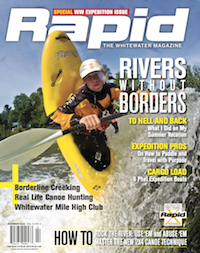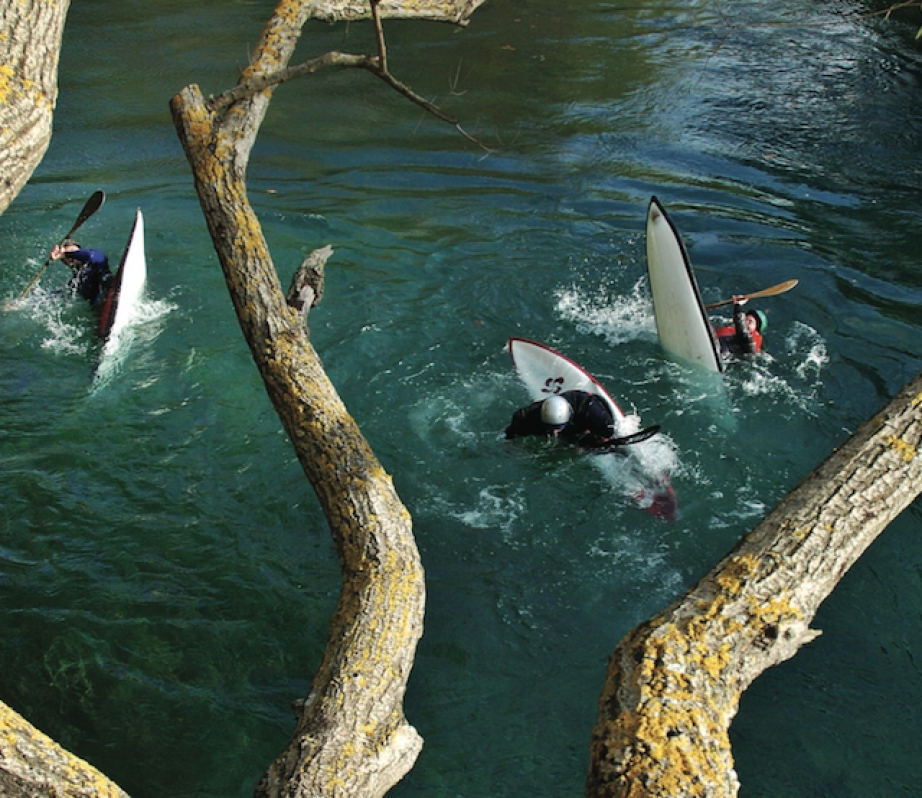The Tao Te Ching (pronounced something like ‘Dow De Jing’) is perhaps one of the oldest known books. As mysterious as its author Lao-tzu, its exact origins are unclear but likely date to before the time of confucius (551-479 b.c.). translated literally, the title becomes The Book of the immanence of the Way and how it Manifests itself in the World or, more commonly, The Book of the Way.
Translated into dozens of languages several times over, the Tao Te Ching is a book of wisdom; an instruction manual on how to navigate the forces of the universe. Its most oft-quoted line is likely familiar to all river people:
Nothing is more soft and yielding than water. Yet for dissolving the hard and inflexible, nothing can surpass it.
Lao-tzu’s philosophy is based on one of softness, and the giving up of control. One must understand and harness the forces of the universe rather than being rigid and fighting them, he suggested—common in the practice of Zen, t’ai chi and aikido. Throughout the years the Tao has been mined by hippy spiritualists, yoga instructors, high-powered management gurus, and squirt boaters.
Seen by the general paddling public, squirt boating is viewed as either confusing or passé… and totally awesome, on rare occasions. Unanimously regarded as the parent to modern playboating, pure squirting enjoyed its heyday in the early ‘90s on big-water rivers such as the Gauley and Ottawa.
The tight-fitting, custom-built, surfboard-like kayaks were designed for neutral buoyancy—half way between floating and sinking—and to tap into un- derwater currents. Back in the day, moves like pirouette squirts, cartwheels and blasting were radical and completely out of the realm of possibility for the voluptuous plastic boats of the time.
The last of the purists (all 70 of them) still gather every summer on the river-left eddyline above McCoy’s on the Ottawa for the infamous Jimmy Cup. The event’s namesake is, of course, Jim Snyder, the Lao-tzu of squirting.
His The Squirt Book is both a manual of squirt technique and an unintentional river translation of the Tao Te Ching. It is as instructive in the art of living as it is in squirting, and as relevant today as when it was first released in 1987 (Menasha Ridge Press).
Even though the moves seem quaint, it is worth re-visiting Snyder’s words at a time when freestyle kayaking is moving about as far away from the Tao as possible.
With pure squirting all but gone—stern squirting in a plastic playboat is incredibly uncool, I’m told— and freestyle defined by aerial acrobatics—getting as far away from the water as possible—softness and “going with the flow” are gone.
The similarities in message and style between the Tao and The Squirt Book are striking. Approach, humility, and control are a few of the many parallel themes.
Like the Tao, Snyder’s guiding philosophy is what he calls charc; the angle of one’s approach to the current dictates the outcome. Charge in and we will be rejected; look at the current and work with it, and we find the “power to apprehend the slipperiness of freedom for those few fleeting moments and to let it soak into our souls,” Snyder writes.
The Tao speaks of this, but refers to an approach towards life:
Rushing into action, you fail.
Trying to grasp things, you lose them. Forcing a project to completion,
You ruin what is almost ripe.
Ultimately, squirting is about humility and respect
Snyder writes, “Our attitudes are putty in the hands of the river… almost everyone went through the stage of being an expert-turned-beginner. Expertise re-emerges as an ability to learn, to listen to the river and our friends.” While Lao-tzu wrote simply:
All streams flow to the sea. Because it is lower than they are. Humility gives it its power.
Snyder’s approach to squirting, rivers and life mirrors the Tao every step of the way. Snyder’s book, while setting the stage for much greater things in kayaking, speaks louder now as a comment on putting the river, current and universe first. It stands in contrast to the bounce and bravado in today’s kayaking, approaching the timelessness of the Tao Te Ching’s verse and message.
But if both of these philosophers are right, and time seems so far to have proven it so, it is worth noting these two final thoughts:
“The best way to affect the outcome of an event is through its beginning” (Snyder).
The master takes action
By letting things take their course.
he simply reminds people
of who they have always been. (Lao-tzu)
Do you think they know where kayaking is going in the future?
Jeff Jackson is a professor of Outdoor Adventure at Algonquin College in Pembroke, Ontario

This article first appeared in the Early Summer 2008 issue of Rapid Magazine.




